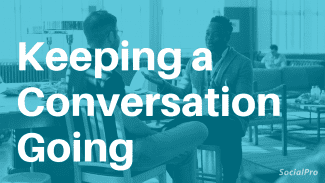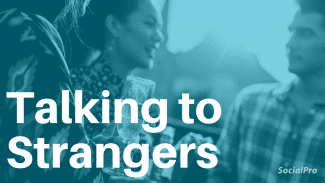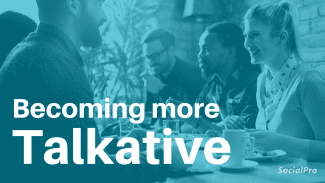There is a natural attraction that pulls together people with similar interests, beliefs, and lifestyles.[1, 2] These similarities create a chemistry that makes it easier to form friendships and close relationships with others.[3] While this chemistry sometimes happens naturally, it can also be created intentionally when people are able to find things in common with each other.
Most people are more alike than different, so it is almost always possible to find things in common with someone. You can use the strategies below to find things in common with people you just met, as well as with friends, coworkers, and even with your partner.
1. Look for the good in people
Your critical mind is hardwired to notice flaws, problems, and threats, but isn’t great at finding the good. Because it’s easiest to bond over positive qualities, interests, and traits, this can make it hard to relate to people. For instance, if you believe someone is full of themselves, you are unlikely to take a second look at them to see what you have in common with them.
Finding the good can become a habit if you take the time to practice by:
- Noticing the things you like about people you have just met
- Finding a way to give a (sincere) compliment to someone new each day
- Seeing every interaction as an opportunity to meet people and make friends
2. Raise your expectations
Sometimes the problem isn’t that you are too different from other people, but instead that you believe that you are and expect that people won’t like or accept you.[4, 5] Expectations like these can cause your rejection radar to interpret everything as a sign that people dislike you.
By raising your expectations, you have a better chance of making a good impression, finding things in common with people, and having a positive and enjoyable interaction with them.[3, 5]
Raise your expectations by:
- Assuming that you have a lot in common with someone you just met
- Expecting people to be friendly and welcoming to you
- Expecting for a conversation, first date, or social event to go well
- Renaming your nervousness about social events as ‘excitement’
3. Broaden the conversation
It’s harder to find things in common with people when you stick to the surface or rely too much on small talk. This can lock you into having the same superficial conversation with people over and over again. By taking the conversation in different directions, you may be able to find out more about someone, including things you have in common with them.
Here are some conversation starters and topics to consider discussing:
- Open-ended questions that can’t be answered with one word
- Funny or interesting stories or jokes
- Movies, books, or activities you or the other person enjoys
- Your personal life, family, or background
- Your beliefs, opinions, or ideas
Don’t assume that you know everything about your partner or long-term friends. Try to keep uncovering new facts about them. Make time for deep discussions; you might be surprised to find that you have unexpected things in common.
4. Treat everyone like a new friend
By treating everyone you meet like they are already a friend, it’s easier for you to relax, be yourself, and enjoy your time with them. According to research, being friendly, warm, and kind is one of the best ways to approach people and make friends.[3] When you are friendly, people are more open with you, and conversations flow more naturally. This makes it easier to find things in common with people.
You can send friendly vibes to people by:
- Starting conversations and introducing yourself
- Smiling and greeting them warmly
- Showing interest in things they talk about
- Remembering and saying their name
- Telling jokes or making them laugh
5. Keep an open mind
Sometimes, people are too quick to pass judgment on other people based on how they look, dress, talk, or act. When you are too quick to judge other people, you might decide you have nothing in common with someone before you even get to know them. Try to keep an open mind and avoid forming an opinion of someone based only on one interaction. This way, you won’t prematurely cross someone off your list before giving them a chance.
6. Let your feelings show
When you are nervous or insecure, you are more likely to repress or hide how you feel, but this can make you harder to read. People might feel nervous or uncomfortable around you if they always have to guess what you are thinking or feeling. By being more expressive and letting your emotions show, it puts people at ease and makes it easier for them to relate and open up to you.
You can work on letting your feelings show more by:
- Changing your tone when you are excited about something
- Using your hands to be more expressive when you talk
- Smiling or using other facial expressions to show how you feel
- Talking about how something makes you feel, whether you like it or don’t, etc.
7. Go public with your hobbies
Sometimes the reason you can’t find things in common with people is that the people around you have different interests and hobbies. Because many people bond over common interests, you can often follow your hobbies to find like-minded people. If you don’t have an active social life, finding hobbies is also a great way to meet people and make new friends.
There are many ways to find like-minded people, including:
- Downloading a friend app that matches you with people based on your interests
- Attend meetups, classes, or events in your community
- Join online groups and forums for people who have the same interests
If you’d like to try a new hobby, invite your partner or friends to join you. You’ll be able to bond over the experience and, if you both enjoy the activity, you’ll have something new in common.
8. Decenter your attention
When you are most nervous, insecure, or tense in social situations, your attention tends to naturally center around your own thoughts and feelings. The more you focus on these thoughts and feelings, the more anxious and insecure you might feel. This anxiety can prevent you from engaging with other people, so you don’t get a chance to find out what you have in common.
When you can change the ‘center’ of your attention to something in the present moment, it can break this cycle, making it easier to relax and be yourself.[6]
Practice decentering by shifting your focus to:
- Where you are and what you can feel, see, and hear
- What others are saying and doing
- Your breath or sensations within your body
9. Follow the signs and social cues
Friendships don’t happen automatically when you meet someone you have a lot in common with. In order for a friendship to form, both people have to be interested and willing to invest time, effort, and energy. Not everyone is willing or able to invest in a friendship, so it’s wise to look for signs that other people want to be friends with you.
Here are some signs that someone wants to be friends:
- They seem interested in spending time together
- They ask questions to get to know you better
- They open up to you and talk about themselves
- They ask you to hang out with them
Final thoughts
By using some of the strategies in this article, you can retrain your mind to find things in common with most people, even when they seem totally different from you.
Keep in mind that your chances of finding like-minded people go up each time you approach someone, start a conversation, or put yourself out there. This can be hard for people who are naturally shy or introverted, but it’s a great way to get better at talking to people.
Common questions about finding things in common with people
How do you find friends with similar interests?
Often, friend apps, meetups, and other social events are places where people go to find like-minded people and make friends. Because most people who attend are there to make new friends, it levels the playing field and makes it easier to connect.
Can you have too much in common with someone?
In general, people like to make friends with those who they perceive to be similar to themselves.[7] However, if you agree on everything, your relationship and conversations may become stale.
Are common interests important in a friendship?
Having some common interests is important because it helps people relate, bond, and enjoy each other’s company. However, there are other key ingredients needed to make friendships work, including mutual interest, honesty, loyalty, and trust.[2, 3]












